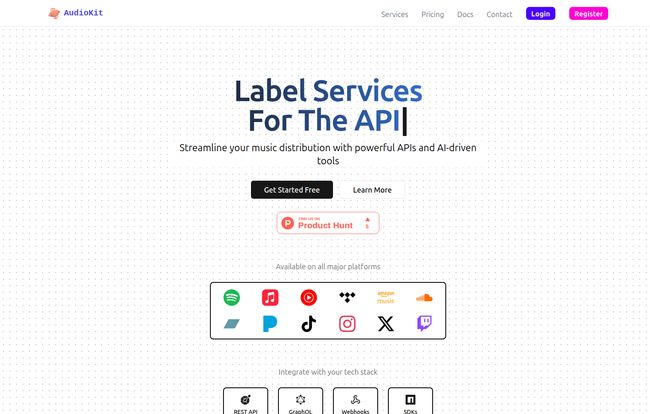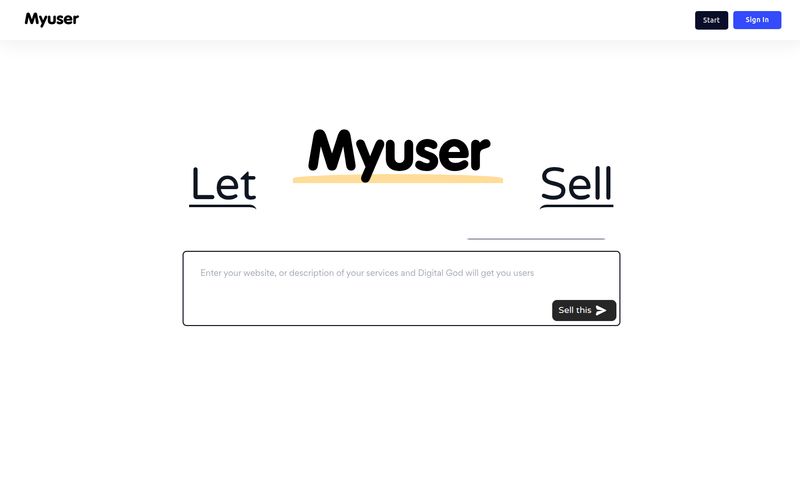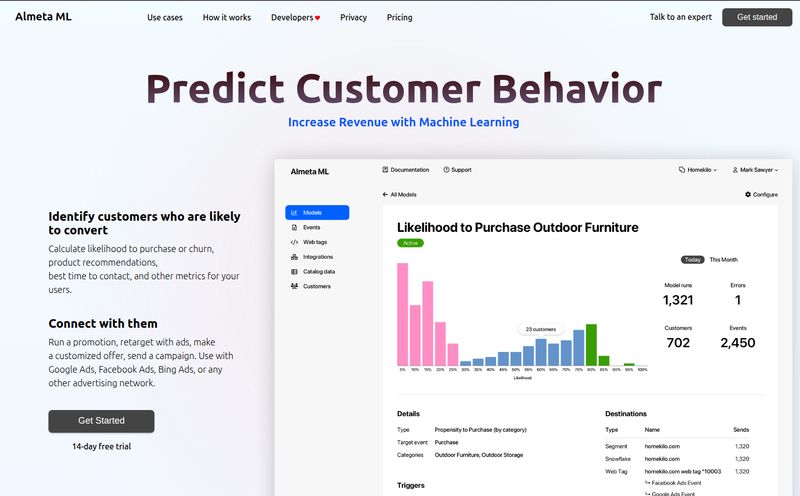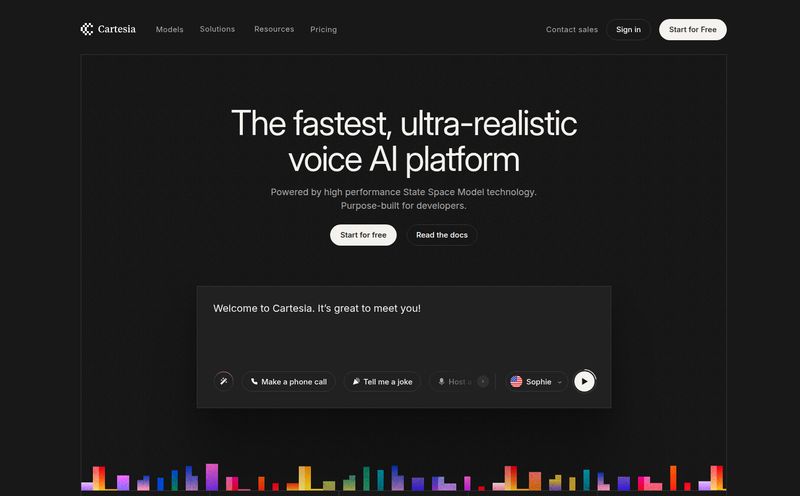I’ve been in the SEO and digital marketing game for years, and if there’s one thing I’ve seen over and over again, it's the painful intersection of art and administration. I have friends—incredibly talented musicians—who can write a soul-stirring ballad in an afternoon but will spend weeks pulling their hair out over metadata, ISRC codes, and the nightmare of getting their tracks onto Spotify without signing away their firstborn.
The music distribution landscape has always felt a bit… clunky. It’s a world of gatekeepers and confusing fee structures. So when a new platform like AudioKit pops up, waving a flag that says "Label Services For The API" and talking about AI-driven tools, my inner tech geek gets a little giddy. But my inner cynic, the one who’s seen a dozen platforms promise to “revolutionize” the industry, raises an eyebrow.
Is this the real deal? Or just another shiny object? I decided to take a closer look.
So, What Exactly Is AudioKit?
At first glance, AudioKit looks like many other music distributors. It promises to get your music on all the major platforms—Spotify, Apple Music, TikTok, Amazon Music, you know the drill. That’s the baseline expectation these days, right?
But that's where the comparison starts to get a little thin. AudioKit isn't just a simple upload-and-go service. It’s positioning itself as a tech platform for music. The big clue is right on their homepage: the emphasis on APIs (Application Programming Interfaces). This isn't just jargon. It’s a signal that they’re building something for people who want more control. Think of it like this: most distributors give you a pre-built car. AudioKit gives you a high-performance engine and a toolkit and says, “Go build the car you want.”
They’re targeting not just the solo artist in their bedroom, but also the developers building music apps and the independent labels managing a whole roster of talent. It’s an interesting, and frankly, much-needed angle.
The Standout Features That Actually Matter
Let's cut through the marketing fluff. Here’s what made me lean in and pay attention.
An API-First Approach for Total Control
This is the big one. For most artists, this might sound overly technical, but for labels or anyone building a music-related service, this is huge. AudioKit offers a REST API, GraphQL, Webhooks, and SDKs. In plain English, this means you can integrate their distribution system directly into your own websites, apps, or internal dashboards. Imagine a record label with its own custom portal where artists can upload tracks, view analytics, and manage releases—all powered by AudioKit on the back end. It's a level of customization that’s been out of reach for anyone but the major players until now.
Those Mysterious AI Creative Tools
Okay, “AI” is the buzzword of the decade, and I’m always skeptical. AudioKit mentions “Creative AI tools” in all their plans. While they don't spell out exactly what these are on the main page, we can make some educated guesses based on where the industry is heading. This could be anything from AI-assisted mastering, generating artwork concepts, or even suggesting lyrical themes. I see it as a potential creative partner. It won’t write your next hit for you, but it might just be the spark that helps you overcome a creative block. It’s a forward-thinking feature that shows they're not just stuck in the present.
Keeping 100% of Your Royalties
This one is critical. On their paid plans, AudioKit lets you keep 100% of your music royalties. This has become a more common practice, thanks to pioneers like DistroKid, but it’s still a massive deal. The old model of distributors taking a percentage cut felt predatory, especially for emerging artists. Seeing this as a standard feature on their paid tiers is a huge green flag for me. You pay your annual fee, and the money your music earns is your money. Simple as that.
A Deep Dive Into AudioKit’s Pricing
Alright, let’s talk turkey. A platform can have all the cool features in the world, but if the price is wrong, it’s a non-starter. AudioKit has a pretty straightforward, three-tiered system. I’ve always appreciated transparent pricing, and they lay it out clearly.
| Plan | Price | Best For | Key Features |
|---|---|---|---|
| Free Forever | $0 | New artists testing the waters | Manage 1 artist, 5 team members, AI tools, basic analytics. No distribution. |
| Individual Artist | $99 / year | Solo artists and bands | Full distribution, keep 100% royalties, sync opportunities, release planning, royalty tracking. |
| Record Label | $599 / year | Indie labels and managers | Manage unlimited artists, advanced analytics, priority API access, custom workflows. |
The Free Forever plan is interesting. It doesn't include distribution, which is a key distinction. It’s more of a dashboard to manage your project, play with the AI tools, and get a feel for the ecosystem. It's a no-risk entry point.
The Individual Artist plan at $99/year is the sweet spot for most musicians. It's competitively priced and includes everything you actually need to get your music out there and get paid for it. The sync opportunities and release planning tools are a nice touch.
The Record Label plan is where the power of the platform really shines. For $599/year, managing unlimited artists is an incredible value proposition. This is where the API access and custom workflows become less of a cool feature and more of a mission-critical tool for running a business.

Visit AudioKit
My Honest Take: The Good and The Not-So-Good
What I'm Genuinely Excited About
I have to say, the API-first philosophy is refreshing. It shows a deep understanding of where the market is going. The music industry is becoming more decentralized, and providing tools for builders is smart. The commitment to 100% royalties on paid plans is a must-have, and I'm glad they didn't miss the mark there. And lets be honest, a functional free tier to let people poke around without commitment? That builds trust. It’s a confident move.
A Few Things to Keep in Mind
No platform is perfect. The main "con" is simply the nature of a tiered system: the best features are reserved for the higher-paying plans. That's just business. The heavy focus on APIs and tech might be a bit intimidating for a less tech-savvy artist who just wants a big, simple “upload” button. While the interface looks clean and minimalist, some might find it too sparse if they’re used to the more colorful, feature-packed dashboards of competitors. It's a matter of taste, really.
How Does AudioKit Stack Up?
So, where does AudioKit fit in the current ecosystem? I see it as a strong contender for a specific niche. If you’re a solo artist, you might compare it to DistroKid. DistroKid is known for its simplicity and a single, low annual fee for unlimited uploads. AudioKit's individual plan is more expensive, but it offers more robust management and planning tools. It feels a bit more… professional.
Against a service like TuneCore, which often operates on a per-release fee structure, AudioKit's annual plan for unlimited releases is very appealing. But AudioKit's true differentiator is its appeal to labels and developers. In that space, it's not just competing; it's creating a new category for accessible, API-driven distribution.
Frequently Asked Questions
- Do I really keep 100% of my music royalties with AudioKit?
- Yes, on the paid 'Individual Artist' and 'Record Label' plans, you do. The platforms like Spotify will take their cut first, but of the money they pay out, AudioKit passes 100% of it to you.
- Is the free plan good enough to start with?
- The free plan is for management and trying the tools, but it does not include distribution to streaming platforms. To release music, you'll need at least the 'Individual Artist' plan.
- What are the "Creative AI tools" exactly?
- The site is a bit vague, but this likely includes tools to assist with aspects of the music creation or marketing process, like artwork generation, mastering suggestions, or descriptive text for your release. It's an evolving feature.
- How is AudioKit different from DistroKid or TuneCore?
- The biggest difference is its powerful API for developers and labels, allowing for custom integrations. It's built for scale and technical control in a way that many other consumer-focused distributors are not.
- Is AudioKit a good choice for a brand new artist?
- Absolutely. The 'Individual Artist' plan is a fantastic starting point. It gives you all the professional tools you need without overwhelming you, and you get to keep all your earnings, which is crucial when you're starting out.
- Can I manage multiple artists on one account?
- Yes, that's precisely what the 'Record Label' plan is for. It's designed to manage an unlimited number of artists from a single dashboard.
So, What's the Final Verdict on AudioKit?
After digging in, I’m genuinely optimistic about AudioKit. It’s not just another face in the crowded music distribution space. It’s a thoughtfully designed platform with a clear vision. It caters to the modern creator—the artist who is also an entrepreneur, the label that operates like a lean startup, and the developer building the next big thing in music tech.
If you're a musician who just wants to get your song online with minimal fuss, it’s a solid option. If you’re a label or developer looking for an engine to power your music operations, it might just be the best new tool on the market. It’s worth checking out their free plan to see if it clicks for you. In an industry that often feels stuck in the past, AudioKit feels like a confident step into the future.
Reference and Sources
- AudioKit Official Website: audiokit.ai
- AudioKit Pricing Page: audiokit.ai/pricing
- AudioKit on Product Hunt: producthunt.com/posts/audiokit



